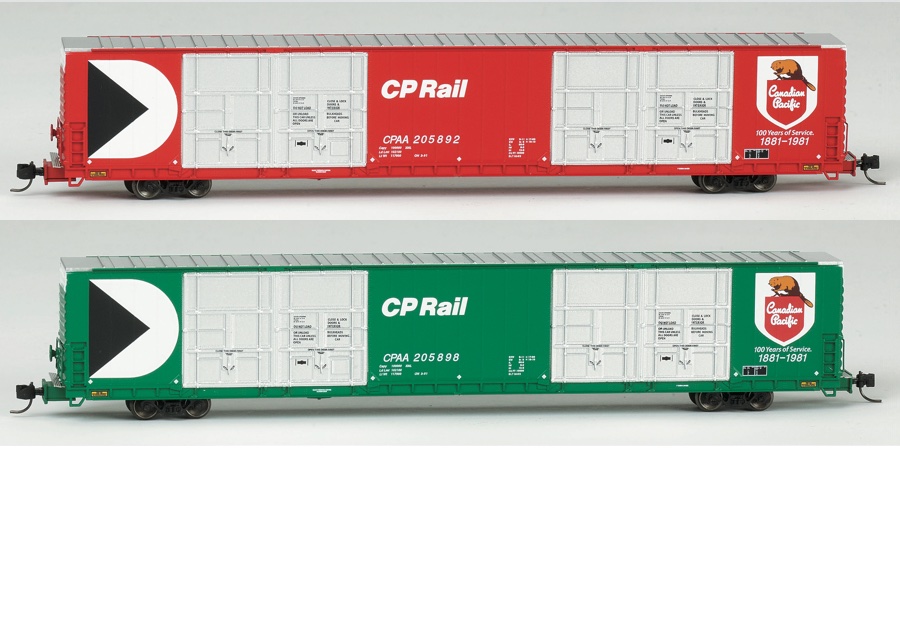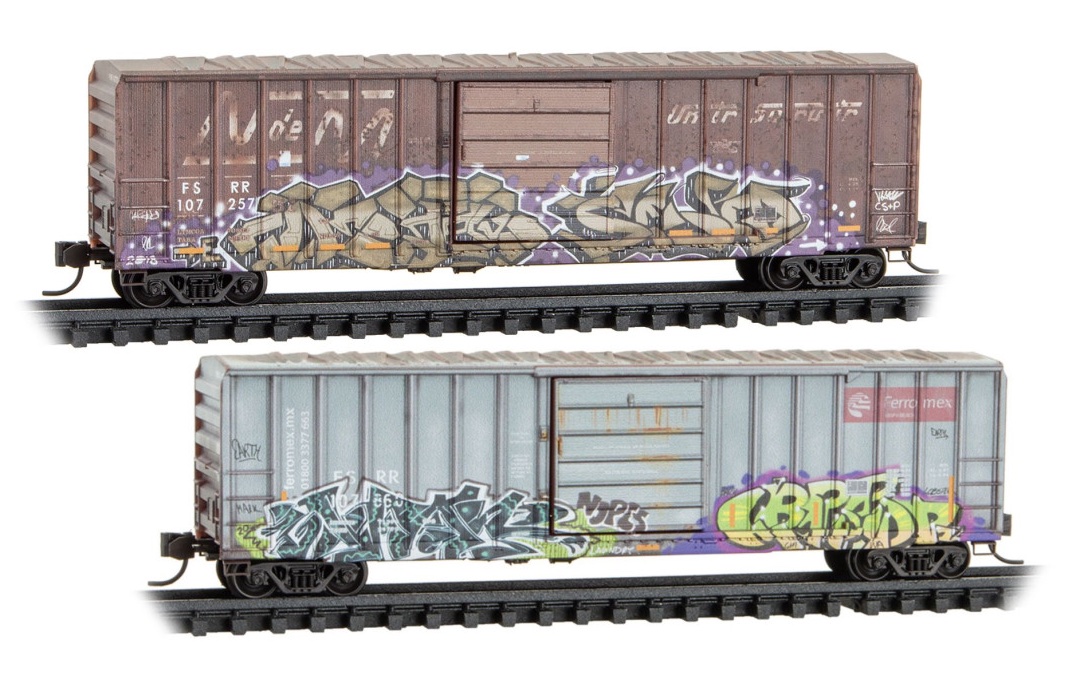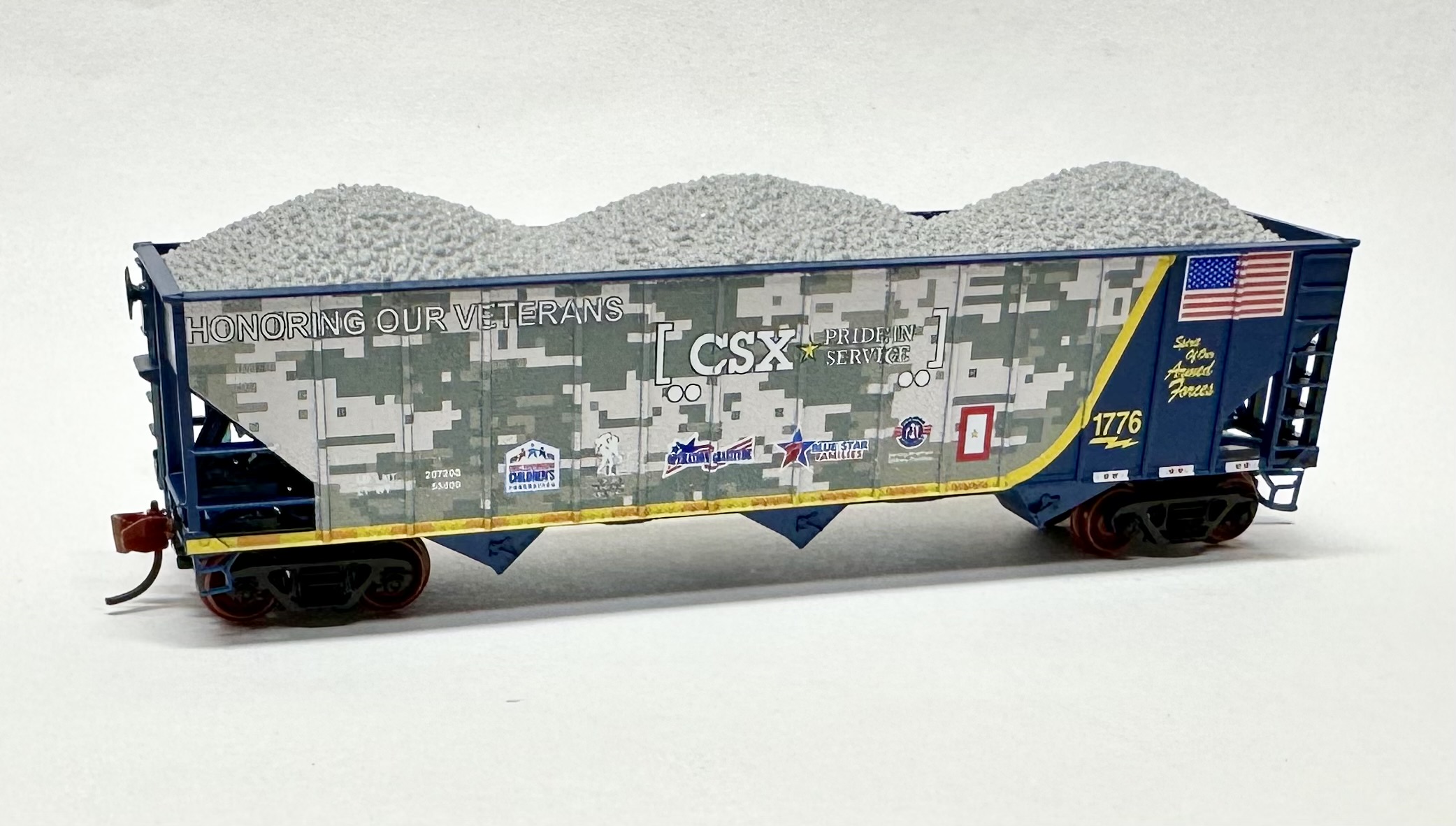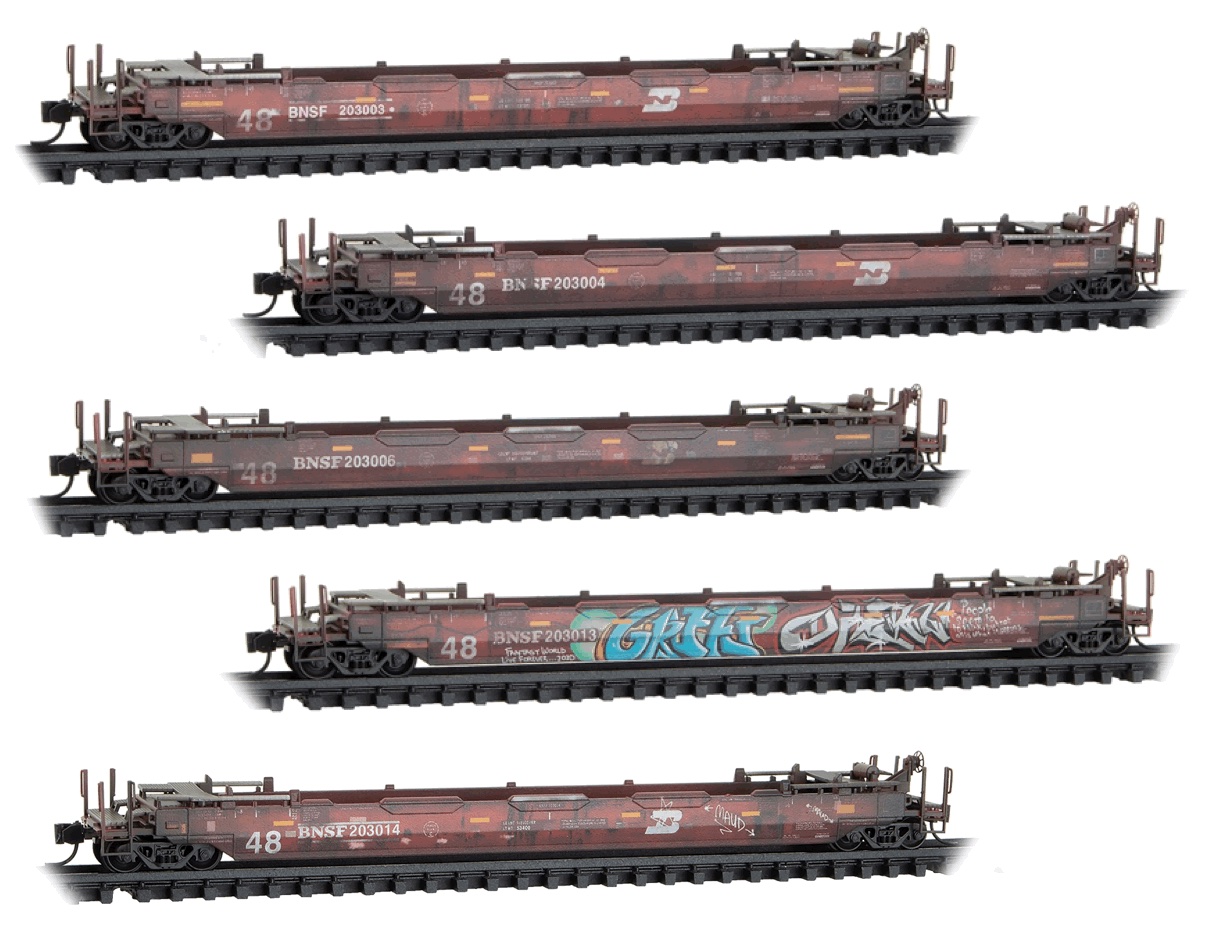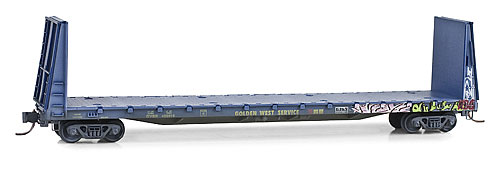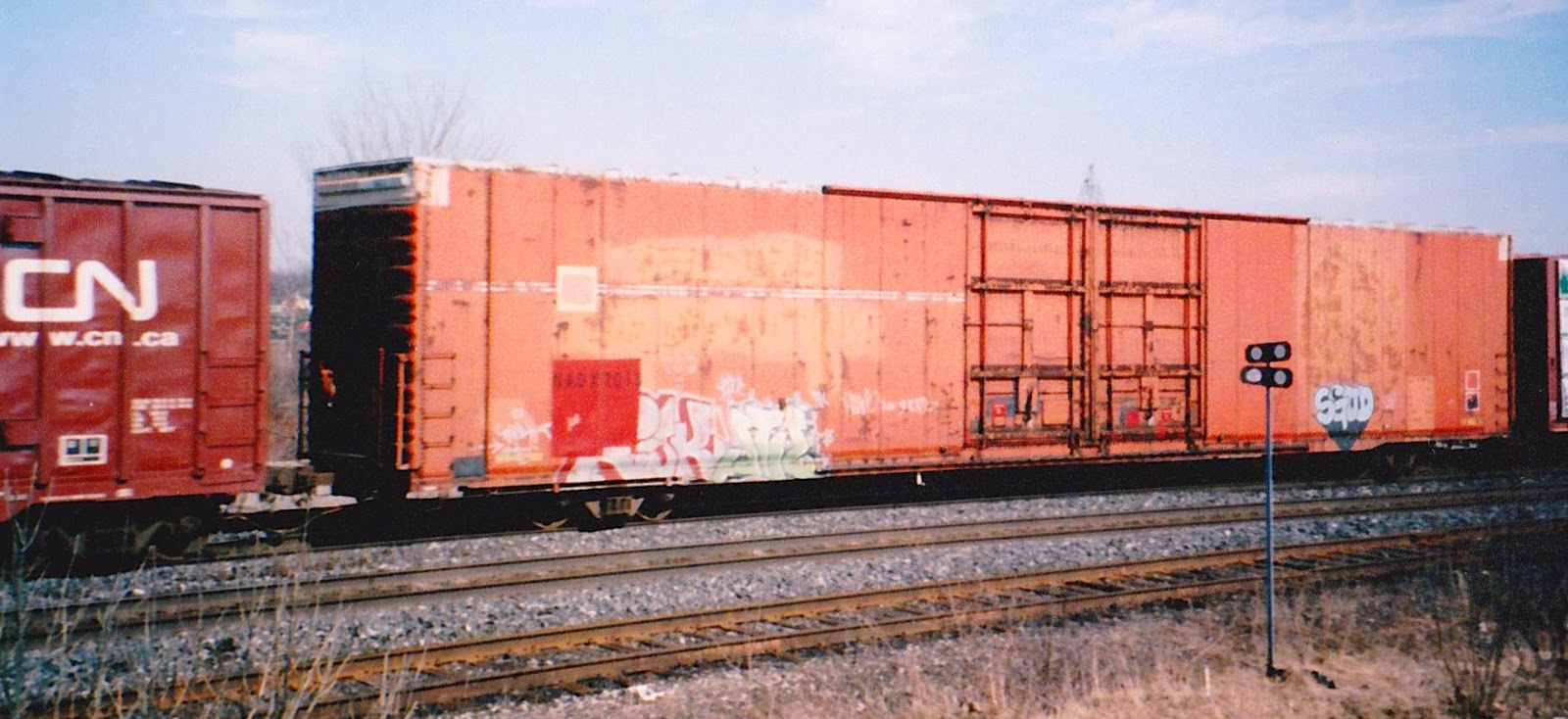Bluford Shops - NSE BLU 25-35 - Boxcar, 85 or 86 Foot, Auto Parts - Canadian Pacific - 205892
| Commissioned By | N Scale Enthusiast |
| Production Type | Special Run |
| Stock Number | NSE BLU 25-35 |
| Original Retail Price | $44.50 |
| Brand | Bluford Shops |
| Manufacturer | Bluford |
| Body Style | Bluford Box Car 86 Foot Auto Parts 8-Door |
| Prototype Vehicle | Boxcar, 85 or 86 Foot, Auto Parts (Details) |
| Road or Company Name | Canadian Pacific (Details) |
| Reporting Marks | CPAA |
| Road or Reporting Number | 205892 |
| Paint Color(s) | Red |
| Additional Markings/Slogan | 100 Years of Service |
| Coupler Type | Generic Magnetic Knuckle |
| Coupler Mount | Truck-Mount |
| Wheel Type | Injection Molded Plastic |
| Wheel Profile | Small Flange (Low Profile) |
| Announcement Date | 2024-08-01 |
| Release Date | 2024-08-01 |
| Item Category | Rolling Stock (Freight) |
| Model Type | Boxcar |
| Model Subtype | 86 Foot |
| Model Variety | Auto Parts 8-Door |
| Prototype Region | North America |
| Prototype Era | NA Era IV: 2nd Gen Diesel (1958 - 1978) |
| Scale | 1/160 |
Specific Item Information:
100 Years Commemorative 2 Car Set
Prototype History:
The three major automobile manufacturers in the United States, Chrysler, Ford, and General Motors, each developed specifications in the 1960s for specially built boxcars to transport automobile parts (not actual cars). They stated, if you build this type of car, your will be welcome to pick up and drop off parts at our plants. Thousands of these cars were built in the 1960s and 1970s. Three railcar manufacturers, Greenville, Pullman-Standard and Thrall took up the challenge and constructed 86 foot boxcars.
These cars are not only distinctive for their length (86 foot, also listed as 85 foot) but also for the fact that they were designed for a post-roofwalk world so they took advantage of the fact they didn't need to leave room for the roofwalk and instead are simply built taller. Hence they are considered High-Cube cars. They come in two major varieties: 8-door and 4-door. The eight door types were typically made for use at GM plants and have two sets of 9 foot doors on each side. When these doors are full opened, they created a pair of 18 foot opening on each side of the car. Their 4-door sisters, as specified by Ford and Chrysler, had one pair of 10 foot doors centered on each side, permitting a 20 foot opening.
As containers gradually replaced these cars for use in the auto industry, many were re-purposed for use in other industries that involve low-density commodities such as scrap paper.
These cars are not only distinctive for their length (86 foot, also listed as 85 foot) but also for the fact that they were designed for a post-roofwalk world so they took advantage of the fact they didn't need to leave room for the roofwalk and instead are simply built taller. Hence they are considered High-Cube cars. They come in two major varieties: 8-door and 4-door. The eight door types were typically made for use at GM plants and have two sets of 9 foot doors on each side. When these doors are full opened, they created a pair of 18 foot opening on each side of the car. Their 4-door sisters, as specified by Ford and Chrysler, had one pair of 10 foot doors centered on each side, permitting a 20 foot opening.
As containers gradually replaced these cars for use in the auto industry, many were re-purposed for use in other industries that involve low-density commodities such as scrap paper.
Road Name History:
The Canadian Pacific Railway (CPR), formerly also known as CP Rail (reporting mark CP) between 1968 and 1996, is a historic Canadian Class I railroad incorporated in 1881. The railroad is owned by Canadian Pacific Railway Limited (TSX: CP, NYSE: CP), which began operations as legal owner in a corporate restructuring in 2001.
Headquartered in Calgary, Alberta, it owns approximately 23,000 kilometres (14,000 mi) of track all across Canada and into the United States, stretching from Montreal to Vancouver, and as far north as Edmonton. Its rail network also serves major cities in the United States, such as Minneapolis, Milwaukee, Detroit, Chicago, and New York City.
The railway was originally built between Eastern Canada and British Columbia between 1881 and 1885 (connecting with Ottawa Valley and Georgian Bay area lines built earlier), fulfilling a promise extended to British Columbia when it entered Confederation in 1871. It was Canada's first transcontinental railway, but currently does not reach the Atlantic coast. Primarily a freight railway, the CPR was for decades the only practical means of long-distance passenger transport in most regions of Canada, and was instrumental in the settlement and development of Western Canada. The CP became one of the largest and most powerful companies in Canada, a position it held as late as 1975. Its primary passenger services were eliminated in 1986, after being assumed by Via Rail Canada in 1978. A beaver was chosen as the railway's logo because it is the national symbol of Canada and was seen as representing the hardworking character of the company.
The company acquired two American lines in 2009: the Dakota, Minnesota and Eastern Railroad and the Iowa, Chicago and Eastern Railroad. The trackage of the ICE was at one time part of CP subsidiary Soo Line and predecessor line The Milwaukee Road. The combined DME/ICE system spanned North Dakota, South Dakota, Minnesota, Wisconsin, Nebraska and Iowa, as well as two short stretches into two other states, which included a line to Kansas City, Missouri, and a line to Chicago, Illinois, and regulatory approval to build a line into the Powder River Basin of Wyoming. It is publicly traded on both the Toronto Stock Exchange and the New York Stock Exchange under the ticker CP. Its U.S. headquarters are in Minneapolis.
After close of markets on November 17, 2015, CP announced an offer to purchase all outstanding shares of Norfolk Southern Railway, at a price in excess of the US$26 billion capitalization of the United States-based railway. If completed, this merger of the second and fourth oldest Class I railroads in North America would have formed the largest single railway company on that continent, reaching from the Pacific coast to the Atlantic coast to the Gulf Coast. The merger effort was abandoned by Canadian Pacific on April 11, 2016, after three offers were rejected by the Norfolk Southern board.
Read more on Wikipedia and on Canadian Pacific official website.
Headquartered in Calgary, Alberta, it owns approximately 23,000 kilometres (14,000 mi) of track all across Canada and into the United States, stretching from Montreal to Vancouver, and as far north as Edmonton. Its rail network also serves major cities in the United States, such as Minneapolis, Milwaukee, Detroit, Chicago, and New York City.
The railway was originally built between Eastern Canada and British Columbia between 1881 and 1885 (connecting with Ottawa Valley and Georgian Bay area lines built earlier), fulfilling a promise extended to British Columbia when it entered Confederation in 1871. It was Canada's first transcontinental railway, but currently does not reach the Atlantic coast. Primarily a freight railway, the CPR was for decades the only practical means of long-distance passenger transport in most regions of Canada, and was instrumental in the settlement and development of Western Canada. The CP became one of the largest and most powerful companies in Canada, a position it held as late as 1975. Its primary passenger services were eliminated in 1986, after being assumed by Via Rail Canada in 1978. A beaver was chosen as the railway's logo because it is the national symbol of Canada and was seen as representing the hardworking character of the company.
The company acquired two American lines in 2009: the Dakota, Minnesota and Eastern Railroad and the Iowa, Chicago and Eastern Railroad. The trackage of the ICE was at one time part of CP subsidiary Soo Line and predecessor line The Milwaukee Road. The combined DME/ICE system spanned North Dakota, South Dakota, Minnesota, Wisconsin, Nebraska and Iowa, as well as two short stretches into two other states, which included a line to Kansas City, Missouri, and a line to Chicago, Illinois, and regulatory approval to build a line into the Powder River Basin of Wyoming. It is publicly traded on both the Toronto Stock Exchange and the New York Stock Exchange under the ticker CP. Its U.S. headquarters are in Minneapolis.
After close of markets on November 17, 2015, CP announced an offer to purchase all outstanding shares of Norfolk Southern Railway, at a price in excess of the US$26 billion capitalization of the United States-based railway. If completed, this merger of the second and fourth oldest Class I railroads in North America would have formed the largest single railway company on that continent, reaching from the Pacific coast to the Atlantic coast to the Gulf Coast. The merger effort was abandoned by Canadian Pacific on April 11, 2016, after three offers were rejected by the Norfolk Southern board.
Read more on Wikipedia and on Canadian Pacific official website.
Brand/Importer Information:
Bluford Shops began in 2007 as a side project of two model railroad industry veterans, Craig Ross and Steve Rodgers. They saw a gap between road names available on N scale locomotives but not available on cabooses. They commissioned special runs of Atlas cabooses in Atlantic Coast Line, Central of Georgia, Monon, Boston & Maine and Southern plus runs on Grand Trunk Western and Central Vermont on the MDC wooden cabooses. While these were in process, they began to develop their first all new tooling project, 86' Auto Parts Boxcars in double door and quad door editions in N scale. By January of 2008, Bluford Shops became a full time venture. Along with additional N scale freight cars and their own tooling for new cabooses, they have brought their own caboose line to HO scale. They also have their popular Cornfields in both HO and N. The future looks bright as they continue to develop new products for your railroad.
The town of Bluford in southern Illinois featured a small yard on Illinois Central's Edgewood Cutoff (currently part of CN.) The yard included a roundhouse, concrete coaling tower (which still stands) and large ice house. Reefer trains running between the Gulf Coast and Chicago were re-iced in Bluford. Things are more quiet now in Bluford with the remaining tracks in the yard used to stage hoppers for mines to the south and store covered hoppers. Intersecting the IC line in Bluford is Southern Railway's (currently NS) line between Louisville and St. Louis. Traffic on this single track line remains relatively heavy.
The town of Bluford in southern Illinois featured a small yard on Illinois Central's Edgewood Cutoff (currently part of CN.) The yard included a roundhouse, concrete coaling tower (which still stands) and large ice house. Reefer trains running between the Gulf Coast and Chicago were re-iced in Bluford. Things are more quiet now in Bluford with the remaining tracks in the yard used to stage hoppers for mines to the south and store covered hoppers. Intersecting the IC line in Bluford is Southern Railway's (currently NS) line between Louisville and St. Louis. Traffic on this single track line remains relatively heavy.
Commissioner Information:
 The N Scale Enthusiast Society (previously known as The N Scale Collector until 2011) was established by Wick Brandon, as a sole proprietorship and was a stand alone company until Wick passed away in 2000. The company has been owned by Micro Trains Line since then.
The N Scale Enthusiast Society (previously known as The N Scale Collector until 2011) was established by Wick Brandon, as a sole proprietorship and was a stand alone company until Wick passed away in 2000. The company has been owned by Micro Trains Line since then.
Wick was the founder of TexNRails and he established NSE right after he sold the pioneering N Scale retailer to the Herz family, and the store moved to Florida. Wick and Lea moved their family from Texas to Bakersfield California, and the entire operation was run from his home in Bakersfield. George Johnsen, the current Chairman, came on board as Associate Editor starting with the third issue of the magazine, and the growth of the organization hasn’t stopped. Wick and George did the first convention in Medford in 1993, and added staff and advisors as the organization grew. Wick held the first auction for the NSE in 1995.
The NSE mission statement reads: “This organization is dedicated to the preservation of the history of N Scale Model Railroading, and the railroads they represent.”
They do:
- Special Run Cars
- Regular Auctions of "collectable" Cars
- Annual Conventions
- Bi-Monthly Magazine
Wick was the founder of TexNRails and he established NSE right after he sold the pioneering N Scale retailer to the Herz family, and the store moved to Florida. Wick and Lea moved their family from Texas to Bakersfield California, and the entire operation was run from his home in Bakersfield. George Johnsen, the current Chairman, came on board as Associate Editor starting with the third issue of the magazine, and the growth of the organization hasn’t stopped. Wick and George did the first convention in Medford in 1993, and added staff and advisors as the organization grew. Wick held the first auction for the NSE in 1995.
The NSE mission statement reads: “This organization is dedicated to the preservation of the history of N Scale Model Railroading, and the railroads they represent.”
They do:
- Special Run Cars
- Regular Auctions of "collectable" Cars
- Annual Conventions
- Bi-Monthly Magazine
Item created by: grothe77
on 2025-03-16 14:18:34
Last edited by: grothe77 on 2025-03-16 14:21:11
If you see errors or missing data in this entry, please feel free to log in and edit it. Anyone with a Gmail account can log in instantly.
Last edited by: grothe77 on 2025-03-16 14:21:11
If you see errors or missing data in this entry, please feel free to log in and edit it. Anyone with a Gmail account can log in instantly.



